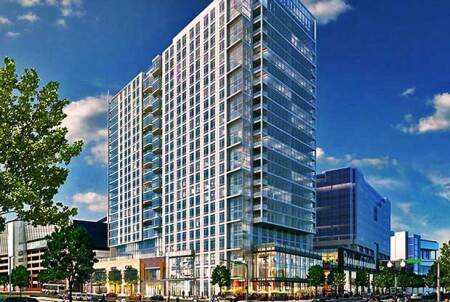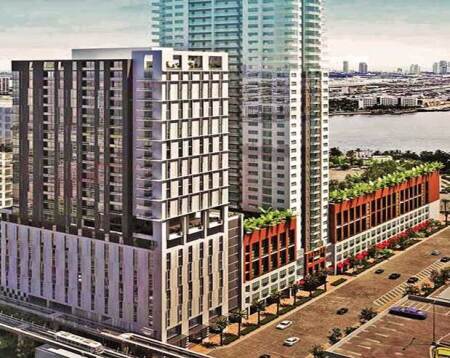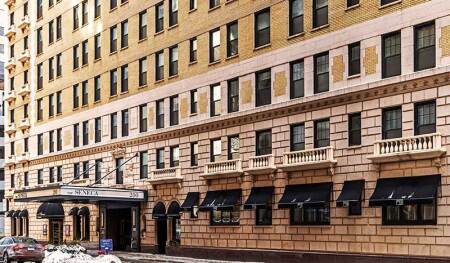This article appeared in the Fall issue of Urban Land on page 240.
During the typical one- to two-year absorption period, developers of new apartments always have a large number of vacant units for a time. Technology-based companies and astute former developers have now raised venture capital to form companies that create and operate pop-up hotels that monetize blocks of new, fully equipped, unleased units, thereby reducing leasing risk for developers and their lenders.
Pop-up hotels represent a new hotel category. They offer complete studio and one- to three-bedroom units that include kitchens with full-size appliances, and bathrooms with washers and dryers. The properties usually include a fitness center and, often, an indoor pool. Located in luxury apartment complexes, these pop-ups include security systems and are price competitive with higher-end hotels. Although like boutique hotels in that each of their properties is different, the new companies operating pop-ups form nationally branded networks that undertake both direct online booking and booking through travel websites like Orbitz, Expedia, and Travelocity. The complete apartment units help pop-up hotels broaden the business market to include relocating corporations and the leisure market for families.
Multiple Benefits
Jason Fudin, chief executive officer of Washington, D.C.–based WhyHotel and a former multifamily developer, says developers partner with his firm because “we de-risk their projects with significant found income, early activation of the building/surrounding area, and an added on-site amenity for new residents—e.g., free room nights and cleaning services.”
The WhyHotel concept was created “by developers, for developers,” Fudin says. He piloted the concept in 2016 when he was vice president for strategic initiatives at Vornado Realty Trust, which at the time was developing the 699-unit Bartlett apartments in the Pentagon City area of Arlington County, Virginia. The company obtained approval in 2015 from the Arlington County Board to use 50 one- to three-bedroom apartments as hotel units for up to two years. The hotel units rented for $179 to $329 per night during the first five months of 2016, when the hotel component wound down because the building had reached 85 percent occupancy. Sensing the promise of the concept, Fudin left Vornado to form WhyHotel in 2017 with his partner, WhyHotel president Bao Vuong, then a vice president of development at urban mixed-use developer PN Hoffman of Washington, D.C.
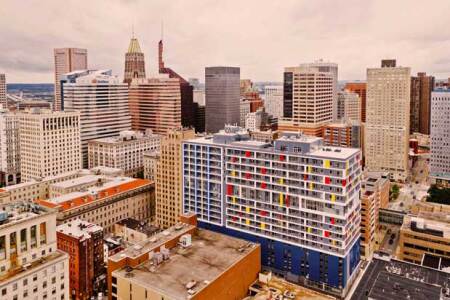
WhyHotel operates 160 units on 12 floors of Monument Realty’s 348-unit, 19-story building at 225 North Calvert Street in downtown Baltimore. That 1970s building, a Maryland National Bank office building before redesign, has 445 parking spaces (the blue section) that facilitate joint hotel/apartment uses. (Hord Coplan Macht Architects)
Their purpose was to operate a national network of temporary hotels—with 24/7 on-site service—in 100 to 250 units occupying up to half the space in new downtown apartment projects during absorption, typically eight to 24 months. Securing that number of units in well-located high-end apartment buildings creates enough critical mass to support furnishing and staffing a temporary hotel, which requires at least one exclusive floor to serve as its hospitality headquarters. WhyHotel scales its unit count with the normal leasing pace, gradually winding down its footprint as units are leased to long-term residents, and ultimately exiting altogether once all units are leased. That gradual wind-down gives developers the ability to spread out their lease renewals so they will not need to re-lease large portions of the building all at once.
WhyHotel has agreements with several major developers. It operates a 95-unit hotel in Equity Residential’s 222-unit, 100 K Street, N.E., project in the North of Massachusetts Avenue (NoMa) section of Washington, D.C., and 160 units on 12 floors of Monument Realty’s 348-unit, 19-story building at 225 North Calvert Street in downtown Baltimore. That building was a former Maryland National Bank office building redesigned for Monument by architects Hord Coplan Macht. The 1970s building has 445 parking spaces that facilitate joint hotel/apartment uses.
WhyHotel operates 175 units in Brookfield Properties’ 406-unit, 22-story Origin Ballston building at Ballston Quarter, three miles (5 km) west of the Pentagon in Arlington County, Virginia, as a pop-up hotel in a project started by Forest City Enterprises before Brookfield acquired that company. It also operates 150 units in the 27-story Rise tower at the Boro in Tysons, 11 miles (18 km) west of Washington, developed by Bethesda, Maryland–based Meridian Group, and 150 units in the 365-unit Centro Arlington project, three miles (5 km) west of the Pentagon, developed by Reston, Virginia–based Orr Partners.
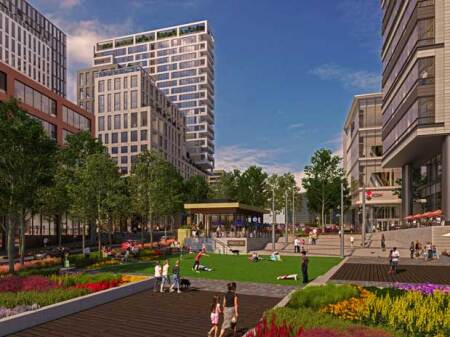
WhyHotel has pursued a clustered strategy in the rapidly urbanizing mixed-use suburban areas of Washington, D.C., such as its 150-unit WhyHotel near the center of the Boro development at the Greensboro Silver Line Metro station in Tysons, Virginia, with a one-acre (0.4 ha) urban space programmed for public events. (Meridian Group/Whyhotel)
The arrangements have benefits for developers and their lenders, but also for long-term renters and the community. For developers, in addition to receiving increased income early in the absorption period, they do not need to invest capital to create the hotel component. They can promote the visibility of their new apartment building in the marketplace, gain a large number of furnished units that can serve as model units for prospective tenants, and increase activity in the building during the leasing period.
Apartment developers gain early master leases and/or revenue sharing of large blocks of units, typically up to 25 to 50 percent of the building’s total. The temporary hoteliers therefore can negotiate favorable lease terms with the developer. The pop-up hotel revenue and occupancy give lenders increased confidence that apartment developers can service their outstanding debt.
Some prospective tenants, particularly those moving to the city, stay in the hotel apartments to help determine if they want to lease there and, if so, which unit size and location they prefer. Existing residents gain access to units they can use for guests, friends, and family without charge or at sharply discounted prices—on a space-available basis for promotional purposes—at their building and others in the network. Cities gain hotel tax revenues and sales tax revenues because the new hotels usually stimulate traffic at nearby restaurants and pubs. Unlike individual short-term rentals by condominium owners or apartment tenants through websites like Airbnb, developers of temporary hotels obtain prior regulatory approval for the blocks of apartment units they will operate. And because the hotels are temporary and the units would otherwise be vacant, cities can rebut arguments that temporary short-term rentals used as hotel units remove housing stock for long-term housing.
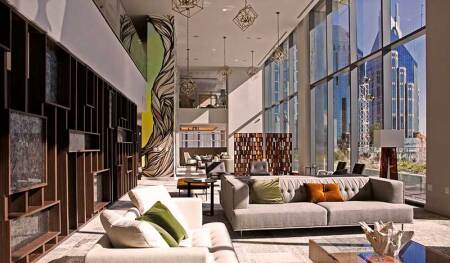
Stay Alfred operates 140 hotel units on 10 floors of the 524-unit, 45-story downtown 505 Nashville Apartments. The tower contains 350 rental apartments and 174 condominiums as well as ground-floor restaurant and retail space. Some pop-up hotels have separate hotel lobbies, like this one at the 505 Nashville Apartments. (Stay Alfred)
Vacation Rentals to Distributed Hotels
Another company in the networked apartment hotel market is Spokane-based Stay Alfred, which started business in 2012 as a vacation rental company. Stay Alfred founder and chief executive officer Jordan Allen, while still serving in the U.S. Army field artillery in 2012, got the idea for a network of apartment vacation rentals in popular downtowns while staying in a new apartment project in downtown Denver near Coors Field to see a Colorado Rockies baseball game. The Spokane native and Portland State University graduate blended his last name with that of his former business partner Conrad Manfred to form Stay Alfred, which has grown to offering more than 2,000 units in 32 U.S. cities.
Stay Alfred’s business model has been shifting from leasing individual units in class A downtown apartment buildings in active cities, to master leasing entire floors of such buildings, to leasing full buildings, to entering partnerships with national apartment developers. Stay Alfred has entered into three- to five-year commercial master leases with renewal options and annual rent escalations. Such deals extend beyond normal lease-up periods and create mixed-use buildings in several projects. Some deals extend up to 15 years, says Michael Pearson, the company’s real estate director.
“This flexibility allows us to tailor-fit our lease to the needs of our partners,” he says, whether those needs are cash flow from anchor tenancy, debt repayment, refinance, or resale. Also, partners can experience decreases in marketing expenses, vacancy loss, turnover costs, and management fees, he says.
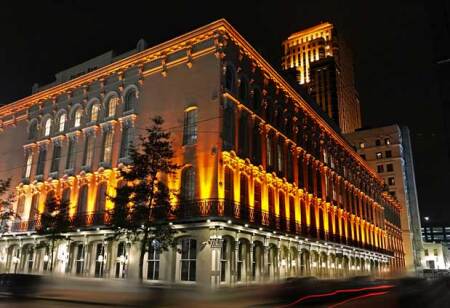
In New Orleans, Stay Alfred master leased the entire rehabilitated historic Factors Row building while it was being reconstructed. It now operates the property as a 49-unit apartment hotel under a three-year master lease with a two-year renewal option, and an annual 3 percent rent escalation. (Stay Alfred)
For example, in the 45-story downtown 505 Nashville Apartments, developed by Nashville-based Giarratana Development and opened in late 2017, Stay Alfred entered a five-year lease with a five-year renewal option and a 3 percent rent escalation clause on 140 units on 10 floors of the 524-unit building. The tower contains 350 rental apartments and 174 condominiums, as well as ground-floor restaurant and retail space. The lobby includes a separate check-in area. Stay Alfred says its involvement helped advance the refinance of the building a year ahead of schedule. It also operates four other short-term apartment hotel projects in Nashville.
In New Orleans, Stay Alfred master leased the entire rehabilitated historic Factors Row building during reconstruction. Stay Alfred now operates it as a 49-unit apartment hotel under a three-year master lease with a two-year renewal option, and an annual 3 percent rent escalation. It has two other hotels in New Orleans.
At Premier Lofts in Denver, Stay Alfred offers 50 apartment hotel units among the 250 in an eight-story building built in 2004 at 2200 Market Street. There it also negotiated a three-year master lease with a two-year renewal option, and an annual 3 percent rent escalation. Pearson says master leases can offer developers a hedge against declining rental rates in a saturated rental market and reduces remarketing costs. Adding a hotel component can enable apartment property owners to reinvigorate and reposition well-located older properties as more contemporary urban mixed-use projects.
Unit Pricing
Temporary hotels require dynamic pricing because hotel demand varies on a daily basis and only a small segment of that market provides competitive apartment units. As a technology-based real estate operator, Stay Alfred developed its own dynamic revenue management system to set and change rates. Its website shows the apartment buildings available in each city with starting room rates below those charged by equivalent hotels. With cleaning and other fees added, rates are comparable but units are larger. “We undertake a comprehensive analysis of the local hotel room rates that helps determine our pricing strategy for a given market, and every location typically requires its own unique pricing strategy,” Fudin says.
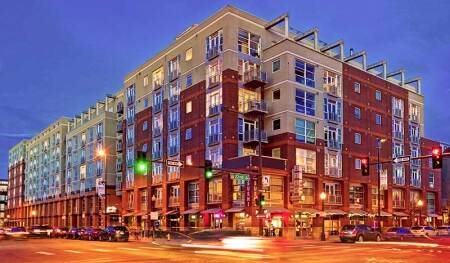
At Premier Lofts in Denver, Stay Alfred offers 50 apartment hotel units in a 250-unit, eight-story structure. There it also negotiated a three-year master lease with a two-year renewal option, and an annual 3 percent rent escalation. Above: Because each apartment project is different, some units in pop-up hotels are two-story lofts, like this one at Premier Lofts. (Stay Alfred)
Cluster Strategy
Stay Alfred uses a cluster strategy to magnify its footprint in a city by offering diverse apartment project options in different downtown locations. In Seattle it offers units in eight locations and in Philadelphia nine, most of which are in newer buildings, but a few of which are in vintage apartment buildings. In Washington, Boston, and Atlanta it has five downtown locations in newer buildings. In Dallas, Chicago, Minneapolis, Charlotte, and Denver it has four, all in newer buildings except one in Chicago, located in a vintage building, the Seneca, a 15-story historic building constructed in 1924 as a hotel and now rehabilitated as studio and one- and two-bedroom apartments. Stay Alfred also operates in smaller cities like Spokane; Boise; and Tempe, Arizona, where it has only one or two locations.
WhyHotel has pursued a clustered strategy in the rapidly urbanizing mixed-use suburban areas of Washington, D.C. In the District’s Virginia suburbs, WhyHotel opened 175 of the 406 units in the Origin Ballston building next to the redeveloped Ballston Quarter, 150 units in the Centro Arlington project, and another 150 units in the 27-story Rise tower at the Boro in Tysons. All three properties are within a few miles of one another. The firm is expanding with hotels in downtown Washington and Baltimore.
The clustering strategy enables a larger impact on a market and offers diverse location options for visitors. Although the large number of units in each WhyHotel location supports separate 24/7 on-site staff, their proximity to each other facilitates training and operational efficiencies. And because its strategy is for orderly wind-downs, clustering permits the company to shift staff to new nearby projects as they open.
WhyHotel’s participation in the development stage also encourages efficient definition of check-in and circulation spaces and patterns to preclude conflicts between hotel guests and longer-term residents, which can easily occur, particularly if the building includes other uses. For example, at Park Avenue West—a building developed by TMT Development in Portland, Oregon, that contains office, retail, and apartment uses, and designed before the advent of pop-up hotels—some guests at the Stay Alfred units wander into the office lobby, where there is 24/7 office security, rather than into the apartment lobby, where there is only a part-time concierge, reports Robert Pile, TMT executive vice president.
Pile was pleased with the project’s accelerated lease-up but notes that a pop-up hotel may affect renewals, especially among residents in a high-end apartment building who did not contemplate living in a hotel, or among office tenants who might object to mixing with hotel visitors. The key is planning the uses and circulation from the beginning, Pile notes. WhyHotel’s separate hospitality floors and wind-down strategy during the absorption period may minimize such conflicts.
Venture Capital
Both Stay Alfred and WhyHotel are beneficiaries of multiple venture capital rounds. In 2018, Stay Alfred raised $62 million, the first $15 million from a Seattle-based private equity group and then another $47 million in a series B funding through Nine Four Ventures, a Chicago-based real estate technology fund. In June 2018, WhyHotel first raised $3.94 million in seed funding from a consortium led by Camber Creek, a New York and Washington firm that funds operating technology companies focused on real estate. In December 2018, WhyHotel raised another $10 million in a round led by Highland Capital Partners, a Boston-based venture capital firm, with further participation from Camber Creek and others.
Those multiple financing rounds from two different groups of venture capital firms for two competitors, based on both the East and West coasts and each with distinctive growth strategies, suggest the business model for temporary apartment hotels has reached a firm enough base from which to expand and grow.
Competitors are many. “We compete with traditional hotels, vacation rentals, corporate housing, and venture-backed short-term furnished operators,” Fudin notes. He distinguishes WhyHotel from competitors. “The distributed hotel companies have a product designed (from an economic standpoint) to capitalize on the arbitrage between nightly stay rates and long-term rental apartment rates,” he says. “Our product does not look to capture that value; instead (from an economic standpoint) it looks to capture the value left on the table by developers during lease-up by putting unused inventory to work.”
Competitors have been able to attract both business and leisure travelers. Stay Alfred suggests that the largest demographic segment of its patrons is 35 to 45 years old, followed by younger millennials, with about another 15 percent being retirees. It reports that its average stay is 3.5 nights for 2.5 guests, suggesting higher occupancy and greater penetration in the extended-stay market.
Alternative Models
A third model is emerging from the London-based hotelier Yotel, which operates micro-hotels in Amsterdam, Boston, Istanbul, London, Miami, New York City, Paris, and Singapore. Starwood Capital Group is one of its major shareholders. Yotel hotel rooms are small, compact spaces it calls cabins.
But in 2018 the company announced its YotelPad concept of larger, for-sale furnished units designed to be rented through Yotel’s in-house short-term rental program. Unlike the case for most condominiums that restrict the total number of rentals, Yotel’s covenants, conditions, and restrictions (CC&Rs) expressly entitle “use as a hotel/lodging unit.” Unit owners can occupy their units or place them in the hotel-unit pool to be rented by YotelPad. Newer competitors like Miami-based real estate developer Newgard Development Group, which has Natiivo-branded projects in Miami (604 units) and Austin (249 units), has projects licensed as hotels, thereby avoiding condominium CC&R or municipal short-term rental restrictions.
YotelPad Miami will be located downtown at 227 NE Second Street and will offer 222 Yotel rooms and 231 YotelPads above the hotel portion of the 30-story building. Aria Development Group and its Kuwaiti joint venture partner Aqarat are developing the project. The Miami YotelPads range from 425-square-foot (40 sq m) studios to 700-square-foot (65 sq m) two-bedroom units starting at about $320,000 for the studios. Another YotelPad project is in development in the Park City, Utah, ski resort area. It will contain 144 units starting at about 340 square feet (32 sq m) and $300,000. Vancouver, British Columbia–based Replay Destinations is developing it for a summer 2020 opening.
Market Dynamics
The surge in higher-end apartment construction has resulted in a surplus in some markets. And the easy availability of lower-priced capital through the EB-5 immigration investor program, often used for urban hotel finance, has increased hotel capacity in some locations, but there is limited capacity in others. Asked whether the temporary hotel market depends on an excess supply of apartments and an undersupply of hotel units, Fudin replied, “No, our product works as long as high-rise apartments take eight months or longer to lease up, which they always do and have.”
WILLIAM P. MACHT is a professor of urban planning and development at the Center for Real Estate at Portland State University in Oregon and a development consultant. (Comments about projects profiled in this column, as well as proposals for future profiles, should be directed to the author at [email protected].)


